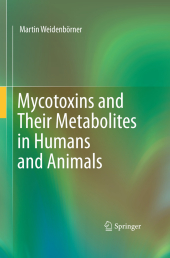 Neuerscheinungen 2014Stand: 2020-02-01 |
Schnellsuche
ISBN/Stichwort/Autor
|
Herderstraße 10
10625 Berlin
Tel.: 030 315 714 16
Fax 030 315 714 14
info@buchspektrum.de |

Martin Weidenbörner
Mycotoxins and Their Metabolites in Humans and Animals
2011. 2014. xxxii, 494 S. 235 mm
Verlag/Jahr: SPRINGER, BERLIN; SPRINGER US; SPRINGER 2014
ISBN: 1-489-98179-9 (1489981799)
Neue ISBN: 978-1-489-98179-0 (9781489981790)
Preis und Lieferzeit: Bitte klicken
This book offers a review of the literature to create a comprehensive reference for mycotoxin levels. This unique database focuses on the incidence of a mycotoxin in humans and/or animals (natural or artificial incidence).
A mycotoxin is a toxin produced by a fungus under special conditions of moisture and temperature. These fungi are aerobic and microscopic and, moreover, may colonize many kinds of food from the field to the table. Mycotoxins are not only a spoilage issue for food, but in high doses can be a serious health threat for humans. The book will be similar to Weidenborner´s previous two books - "Mycotoxins in Feedstuffs" and "Mycotoxins in Foodstuffs" - in that it will be a review of the literature to create a comprehensive reference for mycotoxin levels. It will be his third (and last) book on the topic, this time focusing on the incidence of a mycotoxin in humans and/or animals (natural or artificial incidence). Each entry will include contamination, concentration rate, mean concentration of organs (humans and animals) with a mycotoxin, as well as sample constitution (where possible) and country of origin of the sample.
From the reviews:
"Summarises the results of 636 publications dealing with the occurrence of mycotoxins and their metabolites in human and animal tissues as a result of natural and artificial exposure. ... aims to be of use by physicians and veterinarians, food and feed industry, mycologists and mycotoxicologists, and many others. ... a handsome vademecum on mycotoxins in humans and animals. It is ready for use to get information on many mycotoxins in organisms ranging from ´beef´ to ´woodchuck´ and is based on the scientific literature ... ." (A. D. van Diepeningen, World Mycotoxin Journal, Vol. 4 (3), August, 2011)


